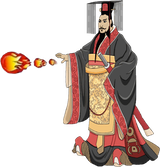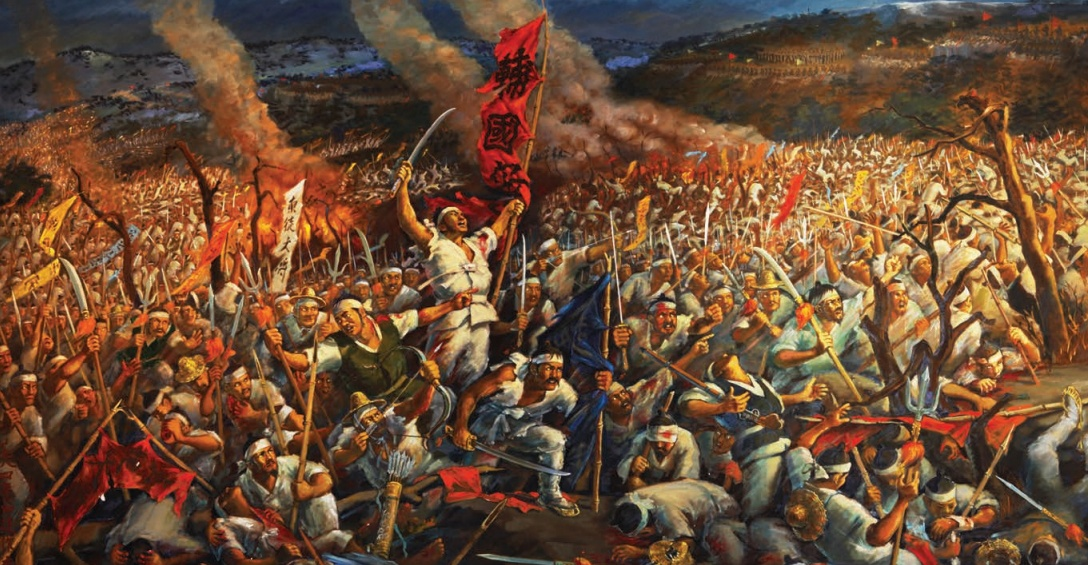On this day in 1894, the anti-colonial Donghak Peasant Rebellion began with the "Gobu Uprising", where 1,000 peasants stormed the county of Gobu, freeing prisoners, occupying government buildings, and causing the county ruler to flee.
The Donghak Peasant Rebellion was an uprising that took place in late Joseon-era Korea during the 1890s. "Donghak" refers to a religious movement, founded in 1860, which preached for social equality and the uplifting of the peasantry. Choe Jeu was executed by the state in 1864.
Amidst a backdrop of growing foreign influence in Korea (which would eventually lead to colonization by Japan), Donghak peasants rebelled against oppression by feudal rulers. The uprising began in the county of Gobu in Jeolla province, where the magistrate had extorted vast amounts of wealth and forced the peasants to build a reservoir.
On January 10th, 1894, approximately 1,000 peasant rebels gathered at an empty horse ranch, from which they split off into two separate armies where they successfully destroyed three of Gobu's four gates, occupied government offices, and set about destroying prisons and freeing the people held in them.
As rebels successfully defeated government forces, unrest would spread across the country, and the panicked Joseon dynasty called for Chinese Qing dynasty for support. Doing this, however, aggrieved the Japanese government, which was competing with China for influence over Korea.
Japan invaded Korea, occupying Seoul, triggering the First Sino-Japanese War. Following a temporary truce, the peasant rebellion would resume in October, this time directed towards the Japanese occupation.
The Japanese proved successful in defeating the uprising, however, continuing to quell rebels through 1895. Korea would become increasingly absorbed into Japan's sphere of influence before official annexation in 1910.
Megathreads and spaces to hang out:
- ❤️ Come listen to music and Watch movies with your fellow Hexbears nerd, in Cy.tube
- 💖 Come talk in the New Weekly Queer thread
- 💛 Read and talk about a current topics in the News Megathread
 Come talk in the New Weekly PoC thread
Come talk in the New Weekly PoC thread- ⭐️ September Movie Nominations ⭐️
reminders:
- 💚 You nerds can join specific comms to see posts about all sorts of topics
- 💙 Hexbear’s algorithm prioritizes comments over upbears
- 💜 Sorting by new you nerd
- 🌈 If you ever want to make your own megathread, you can reserve a spot here nerd
- 🐶 Join the unofficial Hexbear-adjacent Mastodon instance toots.matapacos.dog
Links To Resources (Aid and Theory):
Aid:
Theory:


In the United States, for over a hundred years, the ruling interests tirelessly propagated anticommunism among the populace, until it became more like a religious orthodoxy than a political analysis. During the Cold War, the anticommunist ideological framework could transform any data about existing communist societies into hostile evidence. If the Soviets refused to negotiate a point, they were intransigent and belligerent; if they appeared willing to make concessions, this was but a skillful ploy to put us off our guard. By opposing arms limitations, they would have demonstrated their aggressive intent; but when in fact they supported most armament treaties, it was because they were mendacious and manipulative. If the churches in the USSR were empty, this demonstrated that religion was suppressed; but if the churches were full, this meant the people were rejecting the regime’s atheistic ideology. If the workers went on strike (as happened on infrequent occasions), this was evidence of their alienation from the collectivist system; if they didn’t go on strike, this was because they were intimidated and lacked freedom. A scarcity of consumer goods demonstrated the failure of the economic system; an improvement in consumer supplies meant only that the leaders were attempting to placate a restive population and so maintain a firmer hold over them. If communists in the United States played an important role struggling for the rights of workers, the poor, African-Americans, women, and others, this was only their guileful way of gathering support among disfranchised groups and gaining power for themselves. How one gained power by fighting for the rights of powerless groups was never explained. What we are dealing with is a nonfalsifiable orthodoxy, so assiduously marketed by the ruling interests that it affected people across the entire political spectrum.
Possibly the most evergreen quote of all time
Many people are saying this
Lemmygrad has a bot that will post this if you type "Parenti quote"
I just found out about Parenti quote bot and now I need that. Also Sartre antisemitism quote bot and letter from birmingham jail bot.